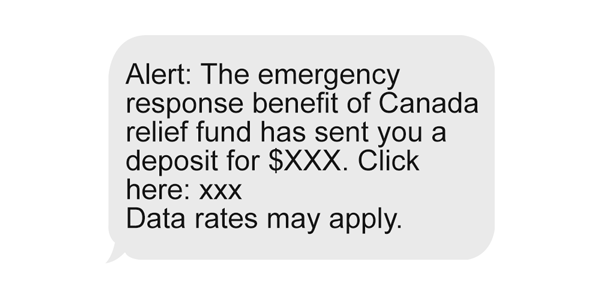In addition to phishing and vishing scams taking advantage of the novel coronavirus disease (COVID-19) pandemic, scammers are sending fraudulent texts and emails that attempt to trick you into believing you have received a government benefit such as the Canada Emergency Response Benefit (CERB).
How the scam works
In one version of the scam, you get a text message or email that purports to come from a government agency such as the Canada Revenue Agency (CRA), or from your financial institution, saying you have received a deposit from the CRA, or important information about the CERB. This is a scam. The CRA will never send you text messages.
In a version of the scam currently circulating, the text message will tell you to click on the link to receive your emergency benefit:

You should never respond to these fraudulent communications or click on any of the links provided.
How to protect yourself
Be skeptical. Fraudulent texts and e-mails can look like they come from a real and credible organization. Banks and government agencies never send emails, texts, or call you asking for personal information or account details, and the CRA will not advise you of your benefits by text or email if you have not applied for emergency government benefits such as CERB.
Don’t reply or click on the link, delete the text and warn others.
Resources
More information about the CERB can be found on the Government of Canada website.
More information about direct deposit of government benefits, visit the CRA’s webpages on direct deposit and COVID‑19.
Canadians can also visit their bank’s website for information on how to enroll for CRA direct deposit or, for those already registered for the service with the CRA, update their account information. Once enrolled, you can receive CRA payments such as benefits, credits and refunds deposited directly into your bank account.
The Canadian Anti-Fraud Centre has compiled a list of the reported scams exploiting COVID‑19.
The COVID Alert application is the Government of Canada’s app for mobile devices to help notify Canadians of potential COVID-19 exposure.